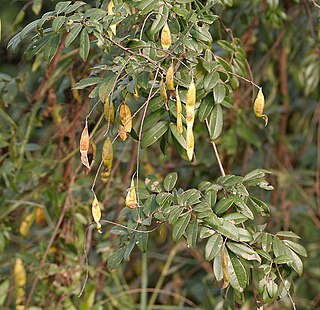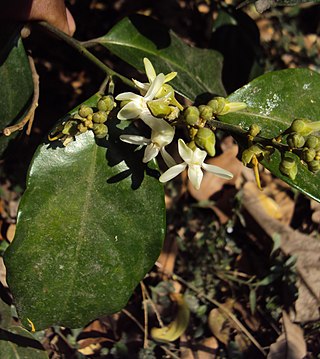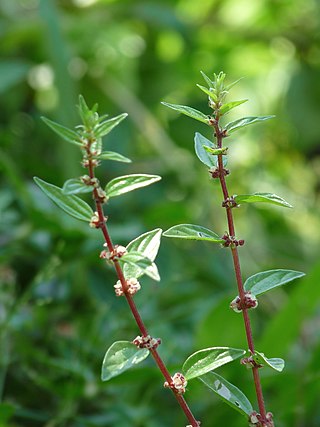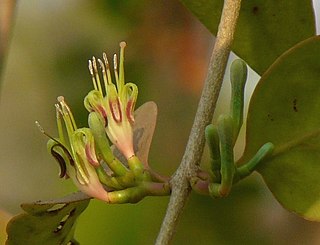
Aralia, or spikenard, is a genus of the family Araliaceae, consisting of 68 accepted species of deciduous or evergreen trees, shrubs, and rhizomatous herbaceous perennials. The genus is native to Asia and the Americas, with most species occurring in mountain woodlands. Aralia plants vary in size, with some herbaceous species only reaching 50 centimetres (20 in) tall, while some are trees growing to 20 metres (66 ft) tall.

Allocasuarina, commonly known as sheoak or she-oak, is a genus of flowering plants in the family Casuarinaceae and is endemic to Australia. Plants in the genus Allocasuarina are trees or shrubs with soft, pendulous, green branchlets, the leaves reduced to scale-like teeth. Allocasuarinas are either monoecious or dioecious, the flowers never bisexual. Male and female flowers are arranged in spikes, the female spikes developing into cone-like structures enclosing winged seeds.

Strobilanthes is a genus of about 350 species of flowering plants in the family Acanthaceae, mostly native to tropical Asia and Madagascar, but with a few species extending north into temperate regions of Asia. Many species are cultivated for their two-lipped, hooded flowers in shades of blue, pink, white and purple. Most are frost-tender and require protection in frost-prone areas. The genus is most famed for its many species which bloom on long cycles of several years, such as Strobilanthes wightii which blooms every thirteen years.

Pterospermum is a genus of flowering plants in the mallow family Malvaceae. Its species are tropical trees that range from southern China across tropical Asia.

Baccaurea is a genus of flowering plants belonging to the family Phyllanthaceae. The genus comprises 51 species, distributed from India to Indochina, southern China, Malesia, New Guinea, and the West Pacific. It is dioecious, with male and female flowers on separate plants. Many species contain edible fruits.

Parkia is a genus of flowering plants in the family Fabaceae. It belongs to the mimosoid clade of the subfamily Caesalpinioideae. Several species are known as African locust bean.

Derris is genus of leguminous plants. It contains 65 species, which range from eastern Africa to the Indian subcontinent, Southeast Asia, New Guinea, northern Australia, and the southwest Pacific islands. The roots of D. elliptica contain rotenone, a strong insecticide and fish poison.

Buchanania is a genus of plants in the mango and cashew family Anacardiaceae, native to areas from India to southern China, and southwards to northern Australia and the western Pacific.

Glycosmis is a genus of flowering plants in the citrus family, Rutaceae and tribe Clauseneae. It is in the subfamily Aurantioideae, which also includes genus Citrus. It is a genus of the subtribe Clauseninae, which are known technically as the remote citroid fruit trees.

Hopea is a genus of plants in the family Dipterocarpaceae. It contains some 113 species, distributed from Sri Lanka and southern India to the Andaman Islands, Myanmar, southern China, and southward throughout Malesia to New Guinea. They are mainly main and subcanopy trees of lowland rainforest, but some species can become also emergent trees, such as Hopea nutans.

Lasianthus is a genus of flowering plants in the family Rubiaceae. They are tropical subshrubs, shrubs, or rarely, small trees. They inhabit the understory of primary forests.

Urophyllum is a genus of flowering plant in the family Rubiaceae, native to from south China to Tropical Asia. The genus was established by Nathaniel Wallich in 1824.

Xanthophyllum is a genus of about 109 species of trees and shrubs, of the plant family Polygalaceae;. The generic name is from the Greek meaning "yellow leaf", referring to how the leaves are often yellow when dry. In Borneo it is known as minyak berok in Malay or nyalin in the Iban language.

Flemingia is a genus of plants in the family Fabaceae. It is native sub-Saharan Africa, Yemen, tropical Asia, and Australasia. In Asia the species are distributed in Bhutan, Burma, China, India; Indonesia, Laos, Malaysia, Nepal, Pakistan, Papua New Guinea, Philippines, Sri Lanka, Taiwan, Thailand and Vietnam. The genus was erected in 1812.

Pouzolzia is a genus of flowering plants in the nettle family. There are about 35 species distributed throughout the tropical world. Most are shrubs, and some are herbs. The genus was named for French botanist and plant collector Pierre Marie Casimir de Pouzolz (1785–1858).

Dendrophthoe is a genus of hemiparasitic shrubs found in Asia and Australia known as mistletoes. The genus was described by German naturalist Carl Friedrich Philipp von Martius in 1830. Species in this genus have a variety of reported uses in the medical traditions of the region, most notably in Nepal.

Scleromitrion is a genus of flowering plants in the family Rubiaceae, native to tropical and subtropical Asia and the western Pacific. The genus was first established in 1834 as a section of the genus Hedyotis, H. sect. Scleromitrion, and was raised to a full genus in 1838.

Macrosolen is a genus of plants in the family Loranthaceae. It includes about 83 species all over the world with ca. 40 species widely distributed in tropical South and Southeast Asia. Some species were described by de Loureiro, Lecomte, Danser (1938) and Hô (2003).

Sonerila is a genus of plants in the family Melastomataceae. This genus is characterized the by presence of three petals as opposed to five in the other members of the family. Most members of the genus prefer growing in shady habitats. It is a large genus including about 175 species.
Shivparvatia is a genus of flowering plants belonging to the family Caryophyllaceae.



















